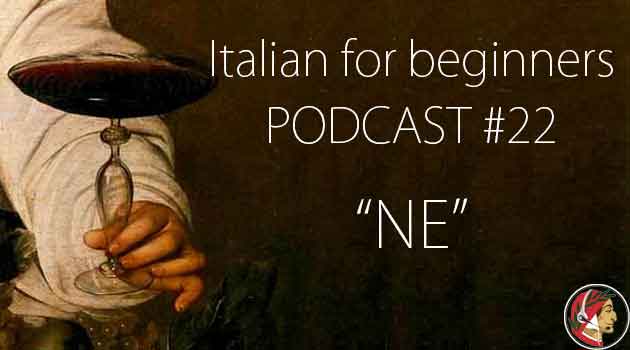We can use the Italian word NE to express different concepts.
The Italian word NE is a “quasi-pronoun”. In fact, NE is more than a simple pronoun and has three main functions. Let’s see them one by one and listen to the podcast.
1. NE as “partitivo”
-
Hai comprato il pane?
-
Sì, l’ho comprato.
-
Quanto NE hai comprato?
-
Ne ho comprato un chilo.
In the first answer, we use an object pronoun. Did you buy bread? Yes I bought IT, – LO ho (l’ho) comprato. Then she wants to know how much bread. I bought one kilogram (of it) = NE
NE helps to identify the number of objects or the proportion of a part related to a whole. The use of NE always depends on nouns or adjectives defining a quantity, such as:
-
Un paio, un centinaio, una decina…
-
Nouns describing a number a part a portion: dieci, metà, un quarto, un pezzo…
-
Indefinite pronouns: qualche, tutto, niente, molti, parecchi, nessuno …
OTHER EXAMPLES
-
Quanti figli hai? – Ne ho due.
-
Ci sono tante zanzare? – Stasera non ce ne sono.
-
Hai dei biglietti della lotteria? – Ne ho comprati tre.
-
Avete dei francobolli? – Sì, quanti ne vuole?
-
Quanti anni ha tua nonna? – Ne ha novanta!
-
Vuoi un caffè? – No, ne ho già bevuti tre.
-
Quanti soldi ti servono? – Me ne servono molti.
-
Vuoi un panino? – Ne voglio solo metà.
2. NE as “motion from a place”
-
A che ora sei andato in ufficio? – Ci sono andato alle otto.
-
A che ora sei uscito? – Ne sono uscito alle 5 di sera.
This use of NE (example B) is related to its Latin origin INDE, similar to the English Thence, “from there”, NE = da lì. It’s possible but rather unusual in spoken Italian. It is instead of common use when NE reinforces idioms. For example: ANDARSENE = Sono stanco, me ne vado – I’m tired, I hit the road (lit. I get myself away from here).
3. NE as “specification”
-
Avete parlato di calcio? – Sì, ne abbiamo parlato.
-
Sai qualcosa di Claudio? – Non ne so niente.
When we talk / think / about something or someone (using the preposition DI = of/about/’s) we can use NE as a pronoun. In other words, NE is the equivalent of “of/about it”.
So, the example A goes: Did you talk about football? – Yes, we talked about it.
B Do you know anything about Claudio? – I know nothing about him.
That’s all, è tutto. Thanks for reading and listening. A presto!

